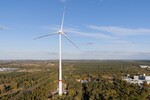News Release from windfair.net
Wind Industry Profile of
Wind Energy Between Nature Conservation and Climate Protection
American offshore wind developer Vineyard Wind plans to build an 800 MW offshore wind farm off the coast of Massachusetts, almost 20 kilometres south of the island of Martha's Vineyard. At the same time, the company is trying to save the highly endangered Atlantic Northern Right Whale. This species is one of the most endangered whale species in the world. It is estimated that only 410 specimens still live in the waters of the North Atlantic.
Exactly in this region off the U.S. east coast the wind farm is to be built. That's why Vineyard Wind is now looking for technology companies or academic institutions to design improved acoustic monitoring systems that detect the presence of Right Whales and provide real-time information to the project staff. The aim is to improve animal welfare quickly and effectively.
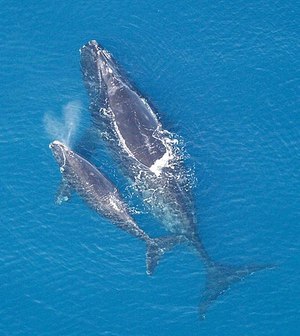 "Vineyard Wind has two goals with this initiative: First, to ensure best protections for the Right Whale (right picture) as we go to build and operate the nation’s first commercial scale offshore wind farm," said Erich Stephens, Chief Development Officer for Vineyard Wind. "Our second goal, which is equally important, is to help place the emerging US offshore wind industry on track to deliver the substantial volume of clean, competitive cost energy that our nation needs while expanding protections for this highly endangered whale."
"Vineyard Wind has two goals with this initiative: First, to ensure best protections for the Right Whale (right picture) as we go to build and operate the nation’s first commercial scale offshore wind farm," said Erich Stephens, Chief Development Officer for Vineyard Wind. "Our second goal, which is equally important, is to help place the emerging US offshore wind industry on track to deliver the substantial volume of clean, competitive cost energy that our nation needs while expanding protections for this highly endangered whale."
Both goals can only be achieved if industry and conservationists work together. That's why the developer signed a historic agreement with several conservation organizations at the beginning of the year to protect the Right Whale.
One of these is the National Wildlife Federation, whose Offshore Wind Officer, Catherine Bowes, emphasizes the benefits to environmentalists: "We’re very excited about the precedent-setting commitments that Vineyard Wind has made to protect Right Whales, and look forward to continuing our work together on this and other initiatives needed to advance responsibly developed offshore wind projects in the Atlantic."
The environmentalists hope to get more information about the whales through the data collected. Up to now, collisions with ships and getting caught in nets have been the main causes of whale mortality. The devices, which are now being developed, are to be used along the transit routes to the offshore wind field off the coast of Massachusetts.
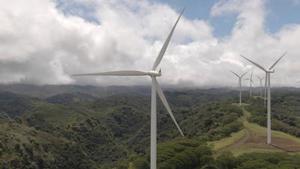 Wind farm operators and conservationists are also working together elsewhere in the US. In Hawaii, all 30 turbines of the Kawailoa wind farm (left, copyright: NRG Systems) will now be equipped with the 'Bat Deterrent System' by NRG Systems to protect the Hawaiian bat. This is an endangered species of the Hoary bat, which is native to the Hawaiian Islands and has been on the list of endangered species since 1970.
Wind farm operators and conservationists are also working together elsewhere in the US. In Hawaii, all 30 turbines of the Kawailoa wind farm (left, copyright: NRG Systems) will now be equipped with the 'Bat Deterrent System' by NRG Systems to protect the Hawaiian bat. This is an endangered species of the Hoary bat, which is native to the Hawaiian Islands and has been on the list of endangered species since 1970.
So far, the wind farm operator has switched off the turbines at low wind speeds at night, when bats are most active. They now hope to further reduce the number of dead bats with the new monitoring system. Brogan Morton, Senior Product Manager at NRG Systems, says: "We have held several trials of our Bat Deterrent System, including tests in Texas and Illinois, and have seen very favorable results among hoary bats. In Texas we saw a 78% reduction in take among this species, and in Illinois we achieved a 71% reduction. Based on this performance, we are confident that our technology will play a key role in helping the Kawailoa Wind team and assist Hawaii in reaching its clean energy goals."
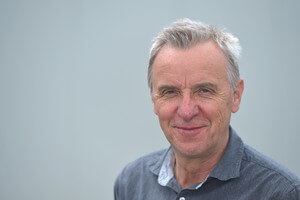 Meanwhile, the situation in Germany is quite different. Johannes Lackmann, Managing Director of wind farm developer WestfalenWIND (right, copyright: WestfalenWIND), recently wrote an open letter to State Secretary Jochen Flasbarth, pointing out that there is now a continuous line of conflict between wind energy companies and many nature conservation actors.
Meanwhile, the situation in Germany is quite different. Johannes Lackmann, Managing Director of wind farm developer WestfalenWIND (right, copyright: WestfalenWIND), recently wrote an open letter to State Secretary Jochen Flasbarth, pointing out that there is now a continuous line of conflict between wind energy companies and many nature conservation actors.
"Over the past 20 years, the wind industry has invested around €1.5 billion in nature conservation as part of its compensation obligations and has only just created many biotopes that are now being cited as counterparts to new wind energy projects. In the meantime, the necessary expansion is being slowed down while the NABU [Naturschutzbund, a German nature conservation group] and the nature conservation authorities enforced by NABU with their veto rights in every immission procedure are the biggest reasons for the slowdown," criticises Lackmann.
He also points out the differences between the various countries: "In other EU countries, technical systems for bird detection and deterrence or shutdown of the wind turbines have long been common practice. With new camera systems and AI, we can reliably detect bird species, their distance and their flight direction. We are now introducing such systems ourselves and having them scientifically tested at our own expense. Since the BfN [Federal Agency for Nature Conservation] is generally critical of wind power, it not only doesn't promote the development of such systems, but rejects the technical protection of species in the first place."
If you take a look at the German newspapers, hardly a day goes by without a report that a new court order is preventing or at least delaying the construction of a wind project. The effects are already clearly noticeable: with the transition to the tendering procedure in Germany, the number of approved projects continued to decrease. The preliminary low point was reached at the beginning of the year: with only 41 wind turbines and a total output of 134 megawatts, new construction in the first quarter of 2019 fell by almost 90 percent compared to the first quarter of the three previous years, as an analysis by FA Wind shows. In addition, the last tender rounds for onshore wind energy have regularly been undersigned.
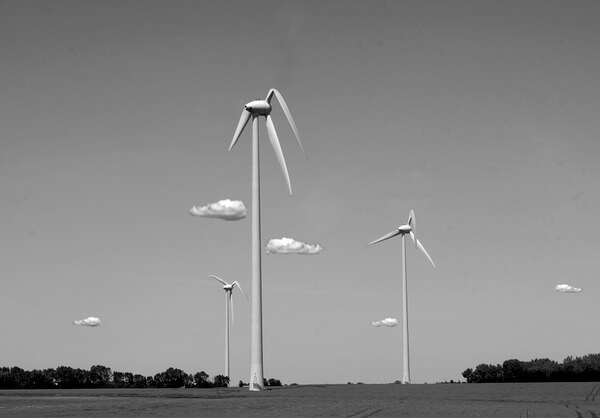
Lack of wind power in Germany (Image: Pixabay)
Lackmann explains: "The licensing authorities are formally lamented, they radically change their licensing practice as a result, and are constantly inventing new species protection tests. (After all bird species were tested individually, expert opinions are now required on the question of what effects wind turbines have on the occurrence of mosses). As a result, immission procedures are becoming more and more complex and longer. If the approval is then available after years, the requested machine type is technically outdated. The approval is then immediately followed by an application for a change to a new machine type in accordance with immissions and the game starts all over again."
Meanwhile, Germany has repeatedly missed its climate protection targets and is increasingly losing ground in Europe. This can't be in the sense of environmentalists either, especially as the alternatives to renewable energies are currently very limited.
- Author:
- Katrin Radtke
- Email:
- press@windfair.net
- Keywords:
- nature conversation, climate protection, USA, Germany, bat, whale, immission, wind turbine, wind farm




